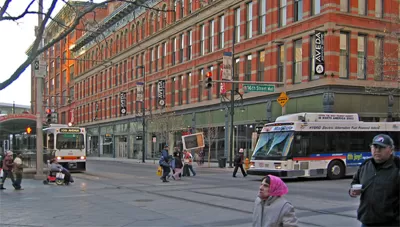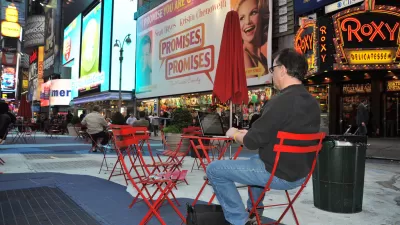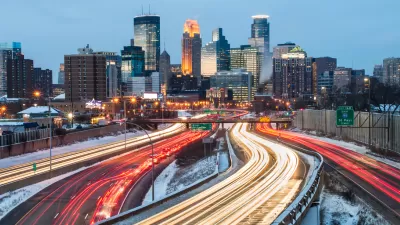Denver and Austin were finalists in the competition. Since then, they've found ways to implement their ideas.

78 cities applied to the Obama Administration's Smart Cities Challenge last year, proposing innovative uses of data, apps, and technology to improve transportation systems. Though Columbus, Ohio was the ultimate winner of $50 million in private and DOT dollars, Governing reports that many of the other cities are also moving forward on their ideas.
In Denver and Austin, just putting the submissions together "energized" city staff and fostered collaboration among people "who normally don't work side by side"—garnering a combination of other federal grants and public-private partnerships to support their plans. Austin is now creating a new regional center where "transportation officials from the city, state, toll roads, and transit agencies can coordinate their day-to-day operations with each other."
That kind of integration was an organizing principle in the Smart Cities Challenge, and for good reason: Coordination behind the scenes can lead to improved traffic and quicker solutions to problems on the ground.
“Ultimately, I don’t care if it’s a state engineer that hits the button that automatically gets more green time on city arterials, or if it’s a city traffic engineering saying, ‘There’s an accident over there on the freeway, so I better put up information signs up and down the freeway so that people know what to expect,” [Austin Transportation's Robert Spillar] said. “That seems simple, but I will tell you it’s like trying to jump over the Grand Canyon.”
FULL STORY: These Places Lost the Smart Cities Challenge. But They Say They Ended Up Ahead.

Alabama: Trump Terminates Settlements for Black Communities Harmed By Raw Sewage
Trump deemed the landmark civil rights agreement “illegal DEI and environmental justice policy.”

Planetizen Federal Action Tracker
A weekly monitor of how Trump’s orders and actions are impacting planners and planning in America.

The 120 Year Old Tiny Home Villages That Sheltered San Francisco’s Earthquake Refugees
More than a century ago, San Francisco mobilized to house thousands of residents displaced by the 1906 earthquake. Could their strategy offer a model for the present?

Opinion: California’s SB 79 Would Improve Housing Affordability and Transit Access
A proposed bill would legalize transit-oriented development statewide.

Record Temperatures Prompt Push for Environmental Justice Bills
Nevada legislators are proposing laws that would mandate heat mitigation measures to protect residents from the impacts of extreme heat.

Downtown Pittsburgh Set to Gain 1,300 New Housing Units
Pittsburgh’s office buildings, many of which date back to the early 20th century, are prime candidates for conversion to housing.
Urban Design for Planners 1: Software Tools
This six-course series explores essential urban design concepts using open source software and equips planners with the tools they need to participate fully in the urban design process.
Planning for Universal Design
Learn the tools for implementing Universal Design in planning regulations.
Clanton & Associates, Inc.
Jessamine County Fiscal Court
Institute for Housing and Urban Development Studies (IHS)
City of Grandview
Harvard GSD Executive Education
Toledo-Lucas County Plan Commissions
Salt Lake City
NYU Wagner Graduate School of Public Service





























